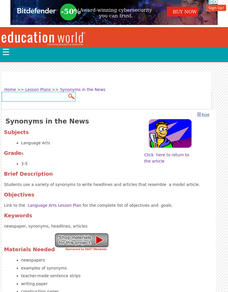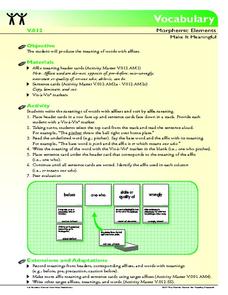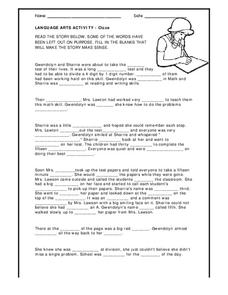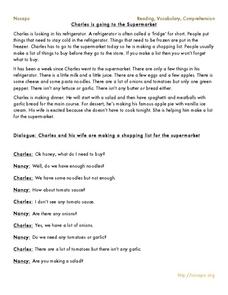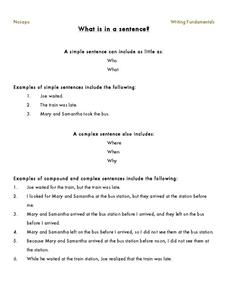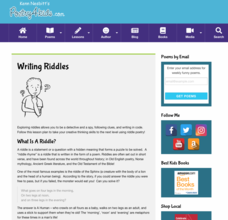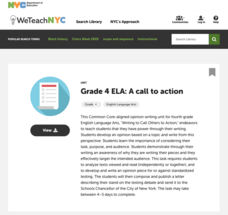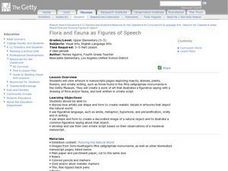K12 Reader
Improve Your Writing with Similes
A language arts worksheet works like a dream. Class members become as busy as bees as they complete a activity geared toward similes. The layout of the sheet is as clear as crystal, with directions that are easy to follow.
Curated OER
Understanding Paragraph Basics
Full of informative, helpful, and accessible activities, a language arts packet is sure to be a valuable part of your writing unit. It's versatile between reading levels and grade levels, and focuses on the most efficient ways for your...
Curated OER
Language Arts Skills: Listening and Speaking Strategies
Your class can practice communicating clearly. They practice listening and speaking through games such asTelephone and a social scavenger hunt. This is a solid lesson that helps apply good communication skills.
Curated OER
Big Grammar Book
With this comprehensive language arts resource in your arsenal, you'll never have to look for another grammar activity! Whether you're teaching kindergartners how to write the upper- and lower-case letters of the alphabet, or helping...
Curated OER
Language Arts Lesson Plan
Students use a variety of synonyms to write headlines and articles that resemble a model article.
K12 Reader
Geometric Shape Names
Combine math and language arts in the same lesson with a reading passage about number prefixes in geometric shapes. After reading several short paragraphs about the different prefixes used in shape names, kids answer five comprehension...
K12 Reader
Phases of the Moon
Take one giant leap for mankind with a reading passage about the moon. Kids learn about the lunar cycle with context clues and reading comprehension questions, making it a good informational text for your language arts lesson.
K12 Reader
What’s the Forecast?
A reading comprehension passage is illustrative for both language arts and earth science skills. Using context clues, learners find out how to predict the weather using various tools. They then answer five reading questions about what...
Florida Center for Reading Research
Vocabulary: Morphemic Elements, Getting to the Root of It
Young readers learn how to get at the root of new vocabulary with this fun language arts activity. When working in pairs, children begin by matching unknown vocabulary words to their Greek or Latin roots. When all the vocabulary cards...
Florida Center for Reading Research
Vocabulary: Morphemic Elements, Make It Meaningful
Scholars learn to find meaning in words using affixes with a language arts activity. In pairs, children sort cards with printed sentences that include words with the prefixes mis- and pre- and the suffixes -er, -ness, and -able. Then,...
Florida Center for Reading Research
Vocabulary: Word Meaning: Know or No
Activate the prior knowledge of young scholars as they expand their vocabulary with this language arts activity. Given a deck of cards containing new vocabulary words, learners sort them into four categories, from Don't know the meaning...
Teach-nology
Language Arts Activity - Cloze
Using context clues is an important skill when mastering reading comprehension. A cloze activity prompts learners to read each sentence in a short passage and fill in the blanks, based on what the rest of the sentence says.
E Reading Worksheets
Predictions Reading into the Future
Practice making inferences about fiction with a language arts slide show presentation. After kids read a few tips about ways to predict the next event in a story, they read several passages and try to find out what will happen next based...
Teach-nology
Editing Informal Letters
Editing a letter isn't quite the same thing as fixing an autocorrected word on your phone, but it's an important skill that can help kids with their language arts skills. Young readers take a look at a short letter before identifying the...
Lakeshorelearning
Read and Write about It
Reading informational text is a skill that transcends subjects and grade levels. Practice reading about different topics in various formats with a language arts lesson that includes opportunities for writing and research as well.
Curated OER
Object Pronouns
Work on replacing the object of a sentence with object pronouns. A handy grammar worksheet prompts language arts learners to read 20 sentences and choose the correct pronoun to fill in the blank from the word box above.
Nosapo
Reading, Vocabulary, Comprehension
Whether you teach mainstream elementary classes or older English learners, a set of reading comprehension resources is a great addition to your language arts curriculum. Ten activities each include a reading passage and set of...
Nosapo
What Is in a Sentence, Paragraph, and Story?
Language arts is made up of many parts. Learners review the parts of a sentence, as well as how to make a simple sentence into a complex sentence, before examining full paragraphs and identifying the topic, body, and concluding sentence...
Poetry4kids
How to Write a Limerick
Add a little fun and fancy to English language arts with an activity that challenges scholars to write a limerick. Authors follow five rules in order to compose an original poem that contains a specific rhyme scheme.
Poetry4kids
Writing Riddles
What's got 60 eyes, 150 fingers, and an endless number of ideas? Your language arts class! Challenge young writers to come up with clever riddles with an online poetry lesson.
New York City Department of Education
Grade 4 Literacy in English Language Arts: A Call to Action
You have the power! Scholars learn that they have power of the pen in their writing. After reading and viewing various sources about standardized testing, they express their own opinions about the testing by writing letters to the...
K12 Reader
Adding Alliteration to Poetry
Alliteration can make the language of a poem flow. Add adjectives to several blanks in two poems to form alliterative phrases.
Mailbox Education Center
On the Hunt: Understanding Figurative Language
Young writers hunt for examples of figurative language in their reading. The hunt requires pupils to cite their sources, record a quoted example for each type of figurative language, and an explanation of what they think the examples...
Curated OER
Flora and Fauna as Figures of Speech
What a lovely way to incorporate artwork into your language arts lesson. View artwork in illustrated manuscript pages, depicting insects, animals, plants, flowers, and ornate writing in the Getty Museum. Practice using figurative...
Other popular searches
- 5th Grade Language Arts
- 3rd Grade Language Arts
- 4th Grade Language Arts
- Second Grade Language Arts
- English Language Arts
- 1st Grade Language Arts
- Kindergarten Language Arts
- Language Arts Jeopardy Game
- First Grade Language Arts
- Language Arts School Projects
- Language Arts Lesson Plans
- Language Arts Games






